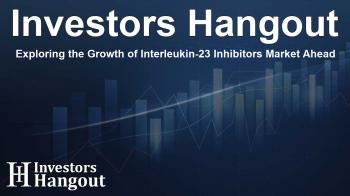Exploring the Growth of Interleukin-23 Inhibitors Market Ahead

Interleukin-23 Inhibitors Market Overview
The interleukin-23 inhibitors market is currently experiencing significant growth, fueled by the escalating prevalence of autoimmune diseases such as psoriasis and inflammatory bowel disease. With innovations in biologics and increasing acceptance of targeted therapies, the demand for these treatments continues to surge. Additionally, favorable reimbursement policies and heightened awareness among healthcare professionals contribute to the market's expansion. This anticipation suggests that the IL-23 inhibitors market will maintain its momentum as research and development efforts continue alongside product label expansions.
Market Dynamics Driving Growth
One of the main factors driving the interleukin-23 inhibitors market is the rising global burden of autoimmune diseases like psoriasis and psoriatic arthritis. These targeted therapies, particularly those that inhibit the IL-23 pathway, have shown remarkable efficacy and safety profiles compared to older treatment options, leading to rapid adoption among healthcare providers and patients. The commercialization of biologics such as SKYRIZI and TREMFYA that specifically target the IL-23 p19 subunit has significantly improved disease management, leading to better treatment adherence. These agents are characterized by less immunogenicity and more convenient dosing schedules, making them appealing to patients.
Current and Emerging Therapies
In the evolving landscape of interleukin-23 inhibitors, there are several therapies currently available, along with an array of promising candidates in the pipeline. Established treatments include OMVOH, SKYRIZI, and ILUMYA, which have received approval for various indications. Emerging therapies like Icotrokinra are exciting, showing potential for transformative effects on patient outcomes in autoimmune disorders. Ongoing clinical trials are exploring their effectiveness not only in dermatology but also in gastroenterology, axial spondyloarthritis, and hidradenitis suppurativa, further widening their therapeutic applications.
Challenges Ahead
Despite its growth potential, the IL-23 inhibitors market faces challenges that could impede its progress. The high cost of biologic therapies can limit patient access, especially in regions with less robust healthcare infrastructure. Moreover, the development of biosimilars represents a competitive threat, although the complexity of monoclonal antibodies presents higher barriers to entry for these products. Competition from other targeted therapies across various pathways, including IL-17 inhibitors and TYK2 inhibitors, may also affect market dynamics and share.
Innovation and Future Directions
The landscape of interleukin-23 inhibitors is continuously evolving as innovative companies explore various avenues to enhance treatment effectiveness. Research is being conducted to develop combination therapies and new formulations to increase efficacy and reduce side effects. Such innovations hold promise for creating more personalized treatment plans that can significantly improve patient outcomes. As IL-23 inhibitors gain traction, the importance lies in navigating cost-related barriers and regulatory landscapes to maintain their competitive advantage.
Interleukin-23 Inhibitors and Market Segmentation
The interleukin-23 inhibitors market spans various indications, with clinical trials and commercialization focused on diseases like ulcerative colitis, Crohn's disease, and psoriasis. Understanding the demographics of affected populations and the distribution of market share between existing and emerging therapeutics will be crucial for companies looking to capture market opportunities. Current analyses suggest a growing patient pool that is expected to drive both demand and development forward.
Conclusion
In conclusion, the interleukin-23 inhibitors market is set for robust growth due to strong clinical results and preferences among healthcare providers and patients for targeted biologic therapies. As the industry navigates cost and competition challenges, the continued innovation in treatment capabilities will be essential for sustaining market momentum and improving patient care.
Frequently Asked Questions
What are interleukin-23 inhibitors?
Interleukin-23 inhibitors are monoclonal antibodies that target the IL-23 protein, aiding in the treatment of autoimmune diseases by modulating the immune system.
How do these inhibitors improve treatment outcomes?
They have been shown to achieve better disease control and safety profiles compared to traditional therapies, leading to improved patient outcomes.
What diseases are treated with IL-23 inhibitors?
These inhibitors are primarily used for conditions like psoriasis and inflammatory bowel diseases, including Crohn's disease and ulcerative colitis.
Are there any emerging therapies in the pipeline?
Yes, therapies such as Icotrokinra and SFA-002 are currently in clinical development, showing promise for expanding the treatment landscape of autoimmune diseases.
What challenges does the market face?
Challenges include high costs limiting access, competition from biosimilars, and other targeted therapy options that could impact market share.
About The Author
Contact Evelyn Baker privately here. Or send an email with ATTN: Evelyn Baker as the subject to contact@investorshangout.com.
About Investors Hangout
Investors Hangout is a leading online stock forum for financial discussion and learning, offering a wide range of free tools and resources. It draws in traders of all levels, who exchange market knowledge, investigate trading tactics, and keep an eye on industry developments in real time. Featuring financial articles, stock message boards, quotes, charts, company profiles, and live news updates. Through cooperative learning and a wealth of informational resources, it helps users from novices creating their first portfolios to experts honing their techniques. Join Investors Hangout today: https://investorshangout.com/
The content of this article is based on factual, publicly available information and does not represent legal, financial, or investment advice. Investors Hangout does not offer financial advice, and the author is not a licensed financial advisor. Consult a qualified advisor before making any financial or investment decisions based on this article. This article should not be considered advice to purchase, sell, or hold any securities or other investments. If any of the material provided here is inaccurate, please contact us for corrections.

